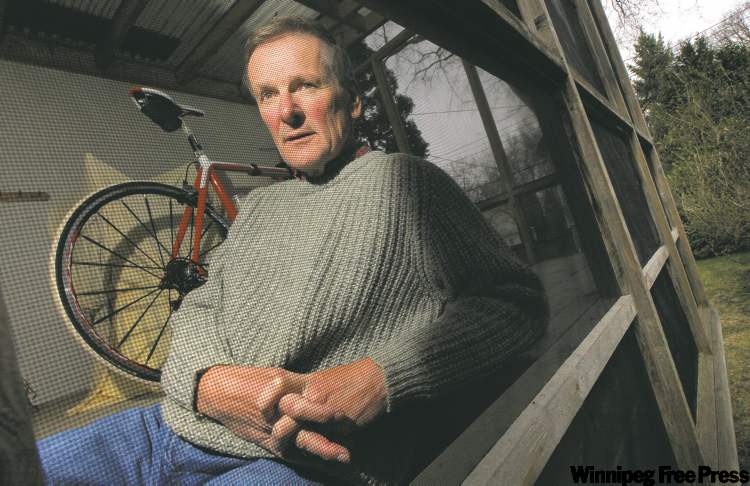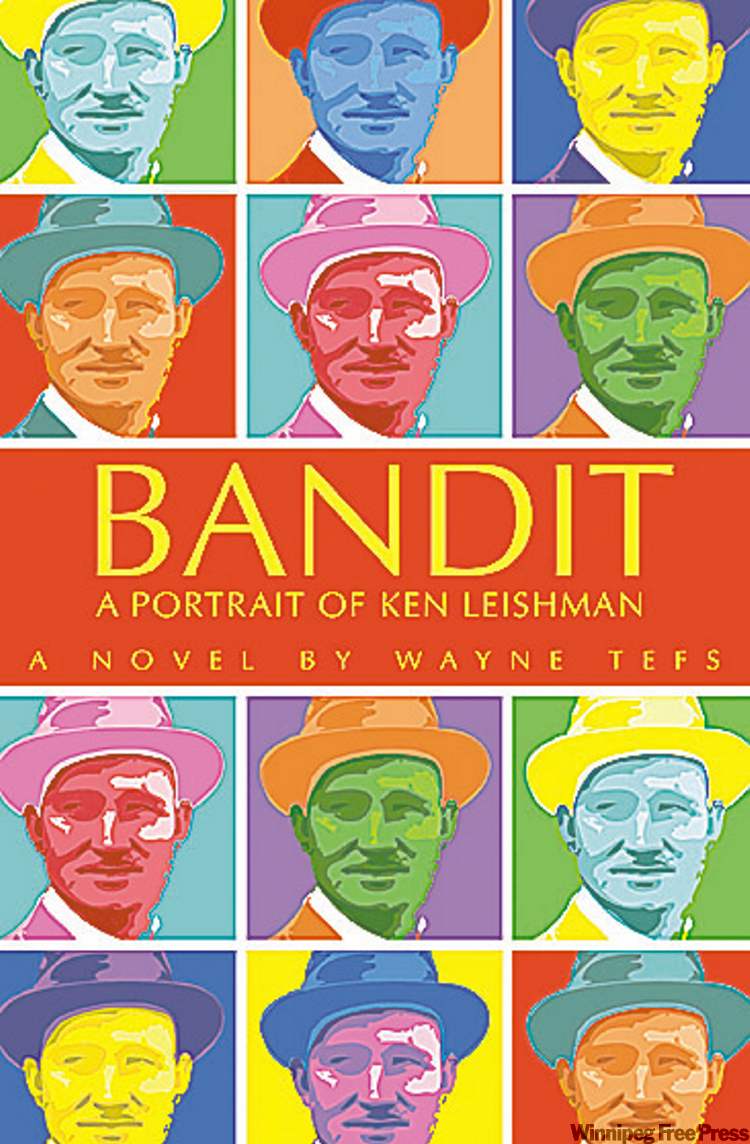Good as gold
Author Wayne Tefs mines the fantastic story of Manitoba heist-meister Ken Leishman for his latest book
Advertisement
Read this article for free:
or
Already have an account? Log in here »
To continue reading, please subscribe:
Monthly Digital Subscription
$0 for the first 4 weeks*
- Enjoy unlimited reading on winnipegfreepress.com
- Read the E-Edition, our digital replica newspaper
- Access News Break, our award-winning app
- Play interactive puzzles
*No charge for 4 weeks then price increases to the regular rate of $19.00 plus GST every four weeks. Offer available to new and qualified returning subscribers only. Cancel any time.
Monthly Digital Subscription
$4.75/week*
- Enjoy unlimited reading on winnipegfreepress.com
- Read the E-Edition, our digital replica newspaper
- Access News Break, our award-winning app
- Play interactive puzzles
*Billed as $19 plus GST every four weeks. Cancel any time.
To continue reading, please subscribe:
Add Free Press access to your Brandon Sun subscription for only an additional
$1 for the first 4 weeks*
*Your next subscription payment will increase by $1.00 and you will be charged $16.99 plus GST for four weeks. After four weeks, your payment will increase to $23.99 plus GST every four weeks.
Read unlimited articles for free today:
or
Already have an account? Log in here »
Hey there, time traveller!
This article was published 19/05/2011 (5284 days ago), so information in it may no longer be current.
The April night in 2008 when his last novel, Be Wolf, nabbed Manitoba’s McNally Robinson Book of Year Award, Wayne Tefs stayed at home.
The veteran Winnipeg writer purposely avoided the backslapping event, as he does every year, including 2001, when his novel Moon Lake won the province’s inaugural Margaret Laurence Prize for Fiction.
“I have nothing but praise for our writing community,” he says. “But there’s something self-congratulatory about those events that I find a bit off-putting.”

At 63, Tefs is an anomaly on the city’s literary scene, a veritable godfather to many of its best practitioners but largely unknown to the general public.
That may change with Wednesday’s release of his 10th novel, Bandit, a so-called docu-fiction from Turnstone Press about one of Manitoba’s most notorious figures, gentleman bank robber Ken Leishman.
Born and raised in rural Manitoba, Leishman acquired his reputation for amiability in the late 1950s after he relieved a Toronto bank of $10,000 while pretending to be friends with the manager.
He cemented his place in the annals of true crime in 1966, when he and four cronies stole $385,000 in gold bullion, the largest gold heist in Canadian history at the time and worth at least $16 million in today’s coin.
The Leishman saga, which contains several other fantastic elements, has been the subject of at least one non-fiction book, a play and a documentary film. So why would Tefs want to tell it again?
“It’s a great story, one I’ve had in my head for at least 20 years,” says Tefs, the middle child and lone son of a German father and Ukrainian mother.
“He was a mixed-up kid from a disenfranchised background. He could be extremely charming but he was also a sociopath.”
Like Be Wolf, which told a true story about a German doctor who survived a 127 Hours-like ordeal in Manitoba’s northern bush, Bandit sticks closely to the facts as they are known. But Tefs invents an interior life for Leishman involving his infatuation with Hollywood matinee idols like Humphrey Bogart to attempt to explain how he went off the rails.
“Wayne believes his writing should be rooted in the world of ordinary people,” says the poet and retired English professor Dennis Cooley.
“He wants his work to be accessible.”
Tefs was born in Winnipeg but grew up in northwestern Ontario. Both academic and athletic, he won the gold medal in arts at the University of Manitoba and a U.S. Woodrow Wilson Fellowship toward his PhD at the University of Toronto.
In 1976, Tefs and Cooley, along with the journalist Robert Enright and University of Manitoba professors David Arnason and John Beaver, founded Turnstone, which has grown into one of Canada’s leading regional literary houses.
At the time, Tefs was teaching English courses at the U of M while completing his PhD. In those early years, they published the likes of Bill Valgardson, Patrick Friesen and George Amabile.
In the summer of 1982, with four years under his belt as an English teacher at St. John’s Ravenscourt, Tefs wrote his first novel, Figures on a Wharf, largely to prove to himself that he could write stuff at least as good as what crossed his desk at Turnstone. It was nominated for the Books in Canada First Novel Award.
Since then has edited literally hundreds of manuscripts for Turnstone, shaping the voices of such Manitoba stalwarts as Armin Wiebe, Margaret Sweatman, Miriam Toews, David Bergen and the late Michael Van Rooy. He has also edited three anthologies of short fiction and poetry.
“He has played an incredible role in the development of Manitoba’s literary culture,” says Turnstone associate publisher Jamis Paulson, who, along with his wife, Sharon Caseburg, bought into the company a few years ago.
Now as then, Paulson explains, when Turnstone publishes the work of any of its shareholders, such as Tefs, Cooley or Arnason, it cannot access public arts subsidies.
“We publish them because we think they’re good.”
In 1994, married to his third wife, law student Kristen Wittman, Tefs was diagnosed with a rare form of intestinal cancer, a carcinoid tumour.
He was told it was inoperable and incurable, though slow-growing. The initial prognosis was two to five years. So he quit teaching, to concentrate on his three-year-old son by his previous marriage (to the journalist Alison Gillmor), his health, his diet and his writing.
That was 17 years and seven books ago. One of the books is a memoir of his battle with cancer, Rollercoaster, which Turnstone released in 2002. It remains one of his most sought-out titles. He has lectured widely in Canada and the U.S. on the strength of it.
“I’m here,” says Tefs, who is tall and lean and barely has a grey hair. “I’m not cured but I continue to try new treatments.”
From their home in leafy Wildwood Park, he and Wittman lead an active, orderly and idyllic life. They’re both committed cyclists and travel to Europe and the U.S. to indulge their passion.
Tefs continues to play old-timers’ hockey. They have a latte at their local coffee house each weekday morning before Wittman, the daughter of the late sportscaster Don Wittman, heads off to her law firm. Tefs writes during the day, then cooks dinner for his wife.
“With Wayne you get the sense that life is sweet,” says Jeremy Williamson, the writer and director of a 30-minute documentary about Tefs which airs on the MTS video-on-demand system.
“He knows it’s a real privilege to do what he does and to live in his imagination all day.”

morley.walker@freepress.mb.ca
Body of work
WAYNE Tefs has written the following books:
Figures on a Wharf — Turnstone Press, 1983
The Cartier Street Contract — Turnstone, 1985
The Canasta Players — Turnstone, 1990
Dickie — Anansi Press, 1993
Red Rock — Coteau Books, 1997
Home Free — Turnstone, 1998
Moon Lake — Turnstone, 2000
Rollercoaster (memoir) — Turnstone, 2002
4X4 — Turnstone, 2004
Be Wolf — Turnstone, 2007
Meteor Storm (short stories) — Turnstone, 2009
He has also edited three anthologies:
Made in Manitoba — Turnstone, 1990
Hearts Wild — Turnstone, 1993
Due West, with Aritha Van Herk and Geoffrey Ursell, Coteau Books, 1996


